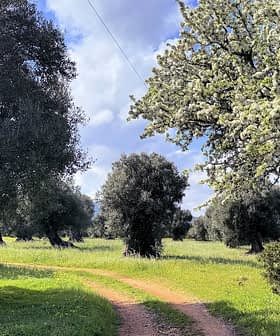UN, EBRD Approve More Support for Tunisia's Olive Sector
The EBRD and FAO are set to continue their support for Tunisia's olive farmers by adding value to Tunisian oil and making cultivation of the crop more sustainable.
Support for Tunisia’s olive sector by the Food and Agriculture Organization of the United Nations (FAO) and European Bank for Reconstruction and Development (EBRD) is set to continue with the approval of the third stage of this multi-year project.
The FAO and EBRD have been providing a much needed boost to this North African country’s olive oil sector for the past five years with the aim to enhance its quality, efficiency and competitiveness.
The whole sector has already demonstrated a willingness to work together to build a brighter future by raising incomes and value added through higher quality.
The next stage of the project is due to begin during the first quarter of 2019 and will focus on increasing competitiveness while raising the international profile of Tunisian olive oil.
“The importance of the olive oil sector to the social and economic fabric of Tunisia is well known, with 300,000 olive growers, and over a million livelihoods dependent on olive oil,” Lisa Paglietti, an economist at the FAO who is heading the project, told Olive Oil Times.
See Also:Africa and the Middle EastBeneficiaries of the first phases of the project have included more than 100 small and mid-sized farms producing olive oil. Specialized training workshops provided insights into aspects related to the entire production process, from the management of olive groves, harvesting, milling and storage, with a focus on sustainable best practices to produce the highest quality olive oil.
“During the last five years, FAO and the EBRD have joined forces to help maintain and further develop Tunisia’s position in the highly competitive global olive oil market and respond to changing consumer demands for olive oil,” Paglietti said. “In particular, special attention has been devoted to increasing value added, raising quality, and ensuring sustainability and inclusiveness of the sector.”
In addition to training, the FAO-EBRD project has also worked on promoting public and private dialogue as well as supporting the capacity of the industry association. As a result of these efforts, there has been increased sharing of knowledge among the sector’s different actors, the identification of investment opportunities and an improvement in the policy environment, which has fostered growth in the sector.
An examination of financial issues revealed that access to finance is a roadblock to development, something the EBRD is addressing by examining how to improve options for financing for small and medium-sized producers.
“We also conducted a detailed review and in-depth interviews with the international purchasers of Tunisian olive oil, which built up a strong picture of the strengths and weaknesses of the current state of play and key issues,” Paglietti said.
“The demand analysis involved interviewing key olive oil players in both traditional and emerging markets for Tunisian olive oil,” she added. “This revealed that by enhancing the offer of medium and high quality extra virgin olive oil, Tunisia can increase its negotiation power with its regular customers for bulk oil and increase the number of potential customers on the bulk market while bottling more and more extra virgin olive oil by its SME producers.”
Tunisian olive oil has experienced an image boost in recent years with an increasing number of producers turning to the production of high-quality extra virgin olive oil, often using organic methods. Recognition has come via several prestigious international awards, with more and more Tunisian producers winning prizes at competitions around the globe. At the 2018 NYIOOC, olive oil producers from Tunisia took home a record haul of 11 awards.
With the next stage of the FAO and EBRD project focusing on competitiveness and recognition as its two main pillars, the international profile of Tunisian olive oil is set to continue its ascent.
“A pilot project demonstrating good agronomic and milling practices showed a large improvement in quality, with, for example, a 200 percent increase in polyphenols in the oil from small basic farmers,” Paglietti said. “Encouraging further quality improvements along the value chain and importantly converting that into higher value added sales is crucial going forward.”
The planned activities to be implemented in 2019 will be geared around providing support to quality development and the growth of exports. Another objective is to expand to new markets by developing other competitive products.
“On the demand side, Tunisian olive oil’s potential is not exploited,” Paglietti said. “There’s a need to improve both oil quality and its stability, broaden the range and characteristics of products offered, and address buyers’ increasing demands for traceability, certification and quality assurance as well as creating awareness of the specificities and qualities of Tunisian olive oil. It is increasingly needed to demonstrate that production, quality, environmental, origin and hygiene standards are being met.”
“Indeed, the whole sector has already demonstrated a willingness to work together to build a brighter future by raising incomes and value added through higher quality, to gain international recognition for Tunisian olive oil and to increase environmental sustainability,” Paglietti added, regarding the achievements in recent years.
“But the future challenge will be converting higher quality oil into increased higher value sales,” she continued. “This is both a technical and cultural process that needs time to evolve as well as the clear setting of goals for the sector to ensure that Tunisia’s considerable potential is realized.”









